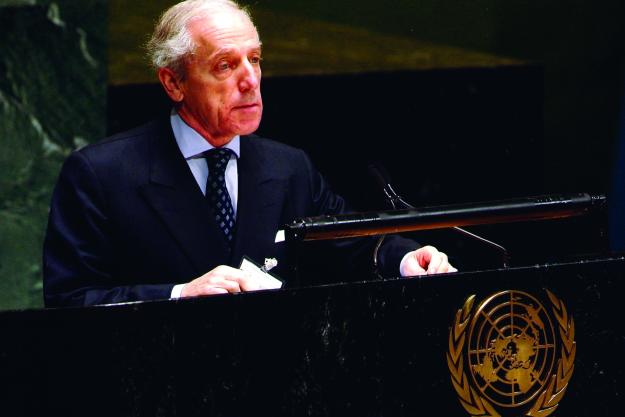
In an address on 15 October 2008 to the First Committee of the 63rd Session of the United Nations (UN) General Assembly, the OPCW Director-General, Ambassador Rogelio Pfirter, hailed the cooperation between the OPCW and the UN as a manifestation of the international community’s aspiration for a law-based, humane and peaceful system of global security with effective multilateralism at its root.
In the First Committee’s general debate on the “Current State of Affairs in the Field of Arms Control and Disarmament and the Role and Contribution of the Respective Organizations,” the Director-General informed the Committee on the results of the Second Review Conference that took place in The Hague from 7 to 18 April 2008. Drawing attention to the Final Report, he highlighted the renewed commitments of States Parties to the noble goals of the Chemical Weapons Convention (CWC) and reiterated its essential contribution to confidence building and cooperation among States Parties. He also noted that the Conference urged the world’s remaining States not Party to ratify or accede to the CWC “as a matter of urgency and without preconditions.”
Director-General Pfirter underlined the OPCW’s achievements in disarmament and non-proliferation, noting the verified destruction of over 41% of the total chemical weapons stockpile declared by the six possessor States Parties. He informed the First Committee that A State Party had completed the destruction of its declared chemical weapons stockpile on 10 July 2008, making it the second State Party to do so after Albania. The Director-General stressed that this achievement takes the OPCW closer to the goal of complete chemical disarmament and reinforces the validity of the CWC.
The Director-General emphasised that together with achieving the goal of disarmament, it was vital to ensure that the non-proliferation regime under the Convention is implemented effectively and to its full potential. He further noted that the effective and efficient industry inspection regime which the OPCW has established is critical to non-proliferation efforts, and to promoting confidence among States Parties in the chemical industry’s legitimate and peaceful activities.
Director-General Pfirter also stressed the need for effective national implementation of the CWC as an important contributing factor to a successful global chemical weapons ban. He underlined the need to strengthen domestic legal and administrative systems in Member States in order to ensure permanence and durability of the norms of the Convention, explaining that loopholes could encourage possible criminal and terrorist uses of chemistry and its products. The Director-General added that contemporary security threats – including the possible use of chemical weapons by non-State actors – have created renewed interest in the OPCW’s ability to coordinate delivery of emergency assistance to Member States. He outlined the Organisation’s international cooperation and assistance programmes which are routinely held in all regions of the world, including training courses for emergency responders, and are supplemented by periodic field exercises in collaboration with the UN and other organisations. He thanked Member States and the European Union for their support to these programmes.
Director-General Pfirter concluded by noting that the OPCW has proved to be a successful experiment in true multilateralism: a forum for consultation and cooperation where States have worked tirelessly on the basis of dialogue and consensus to reach agreement on sensitive and complex issues and to progress effectively towards full implementation of the Chemical Weapons Convention.
